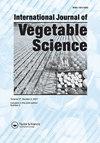Arbuscular mycorrhizal fungus species differed in bio-control potential on pepper genotypes infected with Meloidogyne incognita
Q2 Agricultural and Biological Sciences
引用次数: 0
Abstract
ABSTRACT Root-knot nematode Meloidogyne spp. causes galls on pepper (Capsicum spp L.) roots leading to yield loss. Root-knot disease control in pepper with chemical nematicides is effective but environmental and health concerns are serious drawbacks. Use of arbuscular mycorrhizal fungi (AMF) for control may present a solution. A screenhouse experiment was conducted to assess bio-control efficacy of 4 AMF species against Meloidogyne incognita infecting pepper genotypes with known resistance. Septoglomus deserticola and Funneliformis mosseae were the most efficient (p = .05) AMF species in inhibiting nematode infection, enhancing growth and fruit yield of pepper genotypes. Averaged across pepper genotypes, S. deserticola increased fresh fruit yield by 2.42% and 6.98% compared with Claroideoglomus claroideum and Gigaspora gigantea, respectively, while F. mosseae increased it by 1.43% and 5.95%, respectively. These AMF species might be used as bio-control agents of M. incognita infecting these pepper genotypes.丛枝菌根真菌对辣椒根结线虫感染基因型生物防治潜力的差异
根结线虫(Meloidogyne sp .)在辣椒(Capsicum spp L.)根系上产生瘿瘤,导致产量损失。化学杀线虫剂防治辣椒根结病是有效的,但存在严重的环境和健康问题。使用丛枝菌根真菌(AMF)进行控制可能是一种解决办法。通过筛选试验,评价了4种AMF对已知抗性基因型辣椒的防效。在抑制线虫侵染、促进辣椒生长和产量方面,肉苁茸Septoglomus deserticola和mosefuneliformis mosseae是最有效的AMF物种(p = 0.05)。在不同辣椒基因型中,平均而言,与花梗和巨茶相比,肉苁蓉的鲜果产量分别提高了2.42%和6.98%,而mosseae分别提高了1.43%和5.95%。这些AMF种可作为辣椒隐性支原体侵染这些基因型的生物防治剂。
本文章由计算机程序翻译,如有差异,请以英文原文为准。
求助全文
约1分钟内获得全文
求助全文
来源期刊

International Journal of Vegetable Science
Agricultural and Biological Sciences-Plant Science
CiteScore
3.10
自引率
0.00%
发文量
30
期刊介绍:
The International Journal of Vegetable Science features innovative articles on all aspects of vegetable production, including growth regulation, pest management, sustainable production, harvesting, handling, storage, shipping, and final consumption. Researchers, practitioners, and academics present current findings on new crops and protected culture as well as traditional crops, examine marketing trends in the commercial vegetable industry, and address vital issues of concern to breeders, production managers, and processors working in all continents where vegetables are grown.
 求助内容:
求助内容: 应助结果提醒方式:
应助结果提醒方式:


